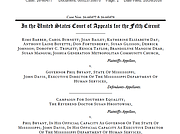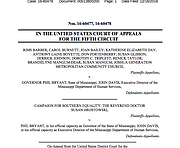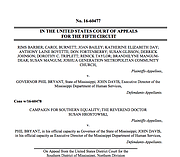Friday, December 16, 2016
Plaintiffs that challenged House Bill 1523, some represented by New York-based attorney Roberta Kaplan, are asking the 5th U.S. Circuit Court of Appeals to affirm U.S. District Judge Carlton Reeves' decision to strike the bill down. Photo by Imani Khayyam.
JACKSON — LGBT rights proponents are pushing back on Gov. Phil Bryant's effort to bring House Bill 1523 back to life today, saying that it endorses and gives special treatment "to certain religions or religious beliefs over others."
The future of HB 1523 is now in the hands of three 5th U.S. Circuit Court of Appeals judges, after Bryant and Mississippi Department of Human Services Executive Director John Davis appealed it. Today, plaintiffs in the lawsuits that stopped the bill from becoming law back in July filed their responses to the appeal.
The bill, also known the "Protecting Freedom of Conscience from Government Discrimination Act," would allow circuit clerks to recuse themselves from issuing marriage licenses to same-sex couples, among other activities, if they believe that doing so violates their religious belief that marriage "is or should be recognized as the union of one man and one woman;" "sexual relations are properly reserved to such a marriage;" and "an individual's immutable biological sex is objectively determined by anatomy and genetics at time of birth."
Plaintiffs argue that HB 1523 endorses these religious beliefs, violating the Establishment Clause of the First Amendment of the U.S. Constitution, which does not allow the government to enforce or endorse one set of religious beliefs.
"While the Constitution guarantees everyone the right to freely practice their religion, no government can establish a religion or officially endorse certain controversial religious views over others," New York-based attorney Roberta Kaplan said in a statement today about the plaintiffs' response. "By singling out three specific anti-LGBT religious beliefs and giving special, absolute rights only to people who hold those beliefs, Mississippi's HB 1523 does exactly that."
The governor's appeal focused on other "conscientious objector" laws that can excuse Americans from performing abortions or serving in the military. Several states piled on in support of Bryant's appeal, asking for "proper protection" for those who disagree with same-sex marriage and the U.S. Supreme Court's decision to legalize it in the 2015 Obergefell case.
Kaplan rejected that argument in the brief filed today. "HB 1523 ... is not like any of the "conscience" statutes cited by appellants. HB 1523 constitutes a radical departure from the many valid conscientious-objector laws in operation throughout the country that identify some narrow conduct—e.g., 'to assist in any aspect of an execution,' or 'to [perform] combatant training and service in the armed forces'—and then exempt all people who for any reason having to do so," Kaplan wrote.
Plaintiffs are asking the 5th Circuit to merely affirm U.S. District Judge Carlton Reeves' decision to strike the bill down as unconstitutional.
"HB 1523 is not severable—if Section 2 is invalidated, the entire statute must fall," Kaplan wrote.
Lawyers combined the two lawsuits challenging House Bill 1523 after Bryant signed the bill into law in April. Lawyers from the Mississippi Center for Justice will file their brief opposing the appeal today as well.
One of the lawyers in the Barber v. Bryant lawsuit, Rob McDuff said HB 1523 endorses discrimination.
“Because this law endorses discrimination in the name of religion, it violates the First Amendment’s prohibition on government endorsement of religious beliefs and the Fourteenth Amendment’s guarantee of equality before the law,” he said in a press statement today. “We hope and believe that the appeals court will uphold the injunction we won in the federal district court. The plaintiffs in our case represent the many thousands of Mississippians who oppose this misguided law.”
This story has been updated with the Barber v. Bryant brief and statement. To read more about House Bill 1523 visit jacksonfreepress.com/lgbt.



